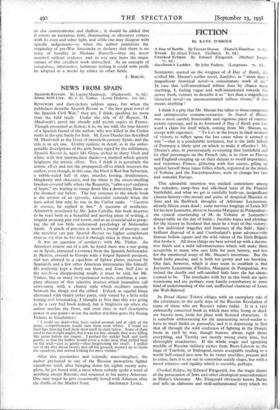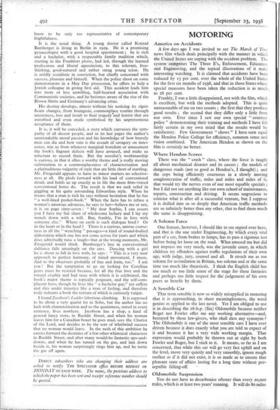_ FICTION
By KATE O'BRIEN
A Day of Battle. By Vincent Sheean. (Hamish Hamilton. 7s. Bread. By Alexei Tolstoi. (Gollancz. 8s. 6d.)
Crooked Eclipse. By Edward Fitzgerald. (Michael Joseph. 7s. 6d.) Jacobson's Ladder. By John Pudney. (Longmans. 7s. 6d.
SOMEBODY, quoted on the wrapper of A Day cf Battle, de- scribed Mr. Sheean's earlier novel, Sanfelice, as " more than a magnificent historical novel—a consummate work of art" In case that well-intentioned tribute does by chance mean anything, I, feeling vague and well-intentioned towards this newer book, venture to describe it as " less than a magnificent historical novel—an unconsummated tableau vivant," if that means anything !
I think it a pity that Mr. Sheean has taken to these competent and unimpressive costume-scenarios. In Search of History was a most careful, honourable and vigorous piece of contem- porary reportage, and in its foreword A Day cf Battle puts for- ward a claim for itself which, coming from Mr. Sheean, we accept with eagerness. " To k o'r at the losers in their moment of victory, to reflect upon the lost cause when it seemed to win "—that is a ponderable invitation, but is the little hillock of Fontenoy a likely spot on which to make it effective ? Mr. Sheean's idea, in picturesquely re-creating that battlefield and its chief personages on the French side, is to show us Prussia and England creeping up on their defeats to world importance, and victorious France, glittering with lost causes, piling up against herself those inane follies which, registered in the minds of Voltaire and the Encyclopaedists, were to change her face and remodel Europe.
This admirable intention was mislaid somewhere among the redoubts, camp-fires and silk-lined tents of the Flemish battlefield, and what we get is carefully built-up, insignificant cinema-history—the moods and pains of dropsical Maurice de Saxe and his flashback thoughts of Adrienne Lecouvreur, already fifteen years dead ; some nervous longings of Louis XV for his new Jeannette, about to become Marquise de Pompadour ; the cynical courtiership of M. de Voltaire at Jeannette's dinner-table on the day of battle ; Jacobite hopes and plottings for the victory in Scotland that must be a fruit of this vic*iry ; a few individual tragedies and humours of the field ; Sxre's brilliant disposal of it and Cumberland's great advance–the famous hollow square and the wild valour of the Irish Brigade that broke it. All these things are here served up with a decora- tive finish and a mild informativeness which will make them acceptable to many who care little for pure history, and less for the smothered irony of Mr. Sheean's intentions. But the book lacks passion? and is both too pretty and too knowing. One fact, however, which it does seem to establish is, that Jeannette Lenormant d'Etioles, Marquise de Pompadour, was indeed the deadly and self-satisfied little bore she has always seemed to be. The interludes with her in this book are quite wearisome and are perhaps even faintly contributory to some kind of understanding of the sad, ineffectual character of Louis the Well-Beloved.
In Bread Alexei Tolstoi obliges with, an exemplary tale of the adventures in the early days of the Russian Revolution of some of those who are Russia's rulers today. It is a very awkwardly conceived book in which men who, living or dead, are history now, jostle for place with fictional characters. It is somehow embarrassing for the unassuming novel-reader to have to meet Stalin en pantoufles, and it is depressing to find that all through the wild confusion of fighting in the Donetz basin in 1918 he was, though human, always right about everything, and Trotsky not merely wrong every time,' but thoroughly treacherous. If the, whole .tragic and agonising muddle of Russian military tactics from Brest-Litovsk to the siege of Tsaritsin, or Stalingrad, seems acceptable reading to a world half-crazed just now by its vaster muddles, present and to come, here it is set out in somewhat untidy shape, but with a moral triteness and rigidity which is enviable, perhaps.
Crooked Eclipse, by Edward Fitzgerald, has the tragic theme of the persecution of Jews and other ideological nonconforthists in Hitler's Germany. -Mr. Fitzgerald obviously knows Berlin and tells an elaborate and, well-authenticated story which we
know to be only too representative of contemporary frightfulness.
It is the usual thing. A young doctor called Konrad Bamberger is living in Berlin in 1929. He is a promising gynaecologist with' a good hospital appointment ; he is rich and a bachelor, with a respectable family tradition which, starting in the Frankfort ghetto, had led, through the learned professions and liberal agnosticism, to this tolerant, free- thinking, good-natured and rather smug young scion. He is mildly socialistic in conviction, but chiefly concerned with success, pleasure and himself. When the police shoot on some demonstrators in a May Day procession, he offers to help a Jewish colleague in giving first aid. This accident leads him into more or less unwilling, half-hearted association with Communistic societies, and he bedomes aware of the rise of the Brown Shirts and Germany's advancing crisis.
His destiny develops, almost without his noticing its signi- ficant changes, from bourgeois, commonplace routine through uneasiness, loss and insult to final tragedy and horior that are ennobled and even made symbolical by his unpretentious acceptance of them. • -
It is, it will be conceded, a story which canvasses the sym- pathy of all decent people, and in its last pages- the author's unmistakable moral passion and his knowledge of how bravely men can die and how vain is the assault of savagery on inno- cence, win us from whatever marginal boredom or amusement the book's flagrant defects will have aroused; and make us reluctant to record, them. But the novelist's workmanship is curious, in that it allies a worthy theme and :a really moving culmination to a commonplaceness of characterisation and a platitudinous vulgarity of style that are little short of startling. Mr. Fitzgerald appears to have in minor matters no selective- ness at all. He plods forward with his load of conventional detail, and holds us up exactly as in life the more firm-voiced conventional bores do. The result is that we seek relief in giggling at his quite astounding Edwardian style. When he means that a man is rich he says without hesitation that he has " a well-lined pocket-book." When the hero has to refuse a woman's amorous advances, he says to her—believe me or not, it is on page sixty-seven : " My dear Sophie, I can assure you I have my fair share of wholesome lechery and I lay my wench down with a will. But, frankly, I'm in love with someone else." Where on earth is such dialogue bred ? Or in the heart or in the head ? There is a curious, untrue coarse- ness in all the " wenching " passages—a kind of round-bodied elaboration which one has not come across for years and which does admittedly raise a laugh—but at the wrong moments, Mr. Fitzgerald would think. Bamberger's line in conversational dalliance falls amazingly on the ears. Dancing with a girl he is about to fall in love with, he says : " This is a very near approach to perfect harmony, of timed movement, I mean. And to the observers probably of line and form, too." I ask you ! But the temptation to go on looking for Corellian gems must be resisted because, for all the free love and the rotund crudity and bad taste with which it is celebrated, the book's major theme is topically poignant, and the self-corn- ' placent hero, though he lives like " a bachelor gay," yet suffers and dies under injustice like a man of feeling, and therefore truly redeems a book the texture of which is curiously vulgar.
,I found Jacobson's Ladder laborious climbing. It is supposed to be about a very quaint lot in Soho, but the author has no luck with characterisation and so the quaintness, stated in every sentence, lives nowhere. Jacobson has a shop, a kind of general fancy store, in Rushlit Street, and when his woman leaves him for a Canadian boxer he goes mad, sees the Chariot of the Lord, and decides to be the sort of whirlwind success that no woman would leave. In the rush -of this ambition he carries forward the destinies of 'a few other whimsical characters in Rushlit Street, and after many would-be fantastic ups-and- downs, and when he has turned on the gas, and lain down beside it, his woman surprisingly rings him up, and he turns the gas off again.
DIRECT subscribers who are changing their address are asked to notify THE SPECTATOR office BEFORE MIDDAY on MONDAY OF EACH WEEK. The name, the previous address to which the paper has been sent and receipt reference number should be quoted.







































 Previous page
Previous page